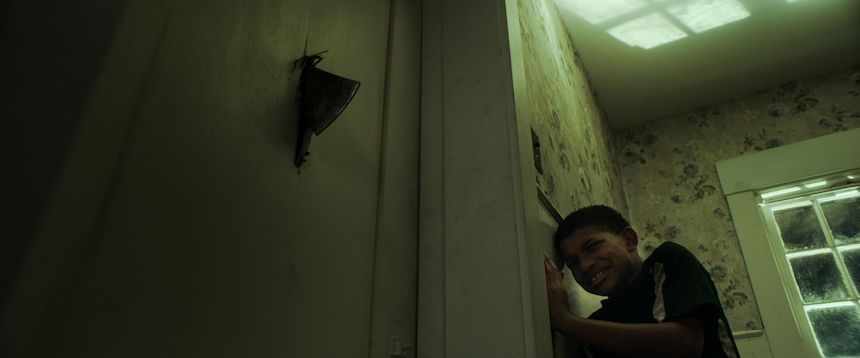Fantastic Fest 2020 Review: THE BOY BEHIND THE DOOR, A Worthy White-Knuckle Thriller
Directed by David Charbonier and Justin Powell, the thriller stars Lonnie Chavis, Ezra Dewey, and Kristin Bauer van Straten.

For their feature-length filmmaking debut, lifelong friends David Charbonier and Justin Powell decided to put a parent’s absolute worst dream, the disappearance of their children on an afternoon like any other afternoon (a real, if mostly unfounded fear, unfortunately, that’s slipped into mainstream politics due to increasingly popular, onetime fringe conspiracy theories), onto the digital equivalent of celluloid film.
Rather than focusing on the parents or the frantic search for their kidnapped children, however, Charbonier and Powell center The Boy Behind the Door on the disappeared children and the physical and mortal peril their kidnappers put them in. It’s undoubtedly a risky proposition, one likely to turn potential audience members away simply from the premise alone. For those willing to embrace the challenge, though, they’ll be introduced to an impressive genre debut.
Charbonier and Powell waste little time setting up The Boy Behind the Door, jumping headfirst into its disturbingly real premise as preteen Bobby (Lonnie Chavis) awakens, bound and gagged, in the trunk of the car belonging to the kidnappers who took him and his best friend, Kevin (Ezra Dewey). Before proceeding further, Charbonier and Powell hit the rewind button, flashing back six hours earlier as Bobby and Kevin, obvious best friends, chill, exchanging banalities common to preteens everywhere and playing a game of catch.
After Bobby overthrows Kevin, Kevin naturally rushes to retrieve the ball. When, though, Kevin doesn’t return, Bobby just as naturally decides to look for his friend. Seconds later, he’s incapacitated, bound, and thrown into the trunk of the car.
Where The Boy Behind the Door differs from other, similar genre films is where it goes next: Bobby manages to escape from the car's trunk. He can flee and probably guarantee his own safety, but with Kevin gone, presumably locked away in the kidnappers’ house, a house not quite literally in the middle of nowhere (only nearby oil derricks to suggest civilization of any kind), Bobby makes the decision that turns him from victim to potential hero: He decides to try to save Kevin.
It’s the kind of decision that puts the audience unequivocally on Bobby’s side, rooting for him not to just survive, but to succeed and save his best friend. It’s also the kind of decision that turns The Boy Behind the Door into the kind of genre entry that, cliches aside, deserves to be described as a “white-knuckled thriller.”
Outmatched in practically every way that should count in or out of a genre film, Bobby has few analogs in the kidnapping sub-genre (which, to be fair, has tended to center on women as victims-turned-heroes, not children). He doesn’t have a special set of skills or training and he's playing the most dangerous game of hide-and-seek possible. He doesn’t have anything except his wits, resourcefulness, and the bond of friendship that pushes him towards self-sacrifice.
And Charbonier and Powell make Bobby earn every bit of the decision to save Kevin rather than simply save himself. Charbonier and Powell put Kevin through the proverbial wringer during the remainder of The Boy Behind the Door’s relatively brief running time, often near the point of capture by the kidnappers, often near the point of physical violence or worse by those same kidnappers.
That putting the preteen Kevin at such persistent, repeated mortal danger doesn’t seem gratuitous, cruel, or callous doesn’t rally the audience against Charbonier and Powell says something about their deft handling of difficult, potentially exploitative subject matter. Keeping The Boy Behind the Door centered almost exclusively on Bobby and Kevin keeps our sympathies, empathy, and most importantly, our identification firmly with the preteen protagonists.
To that end, Charbonier and Powell don’t bother trying to humanize the kidnappers. They’re essentially monsters with human faces, monsters in human skin suits, all the more terrifying because they look and sound human, but their goals are antithetical to everything we consider human.
All in all, Charbonier and Powell appear to be the real deal. They have a thorough understanding of the basics of thriller/horror filmmaking, including visual composition, scene construction, and pacing. Almost as importantly given their decision to focus their first film on preteen characters, they’ve managed to elicit grounded, naturalistic performances from their two leads.
A film like The Boy Behind the Door can ― and often does ― hinge entirely on the believability of the performances they elect from their young actors. They chose well, especially with Chavis. As Bobby, Chavis has to carry emotionally heavy scenes that would prove challenging for actors 5-10 years older. That’s obviously due to a combination of casting, talent, but given Chavis’ age, Charbonier and Powell’s collective ability to direct a young actor to give a performance that never takes the audience out of the film.
The film enjoyed its world premiere at Fantastic Fest on September 27, 2020. More information can be found on the official site.







